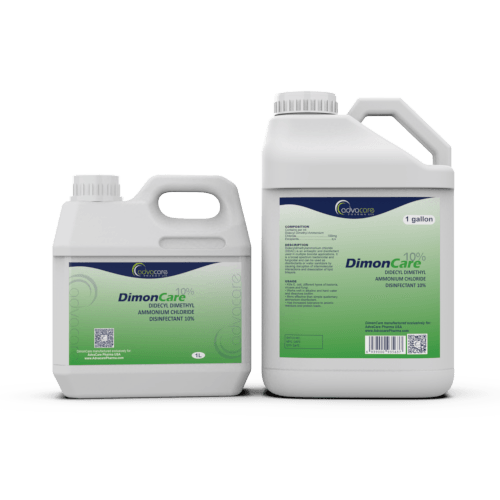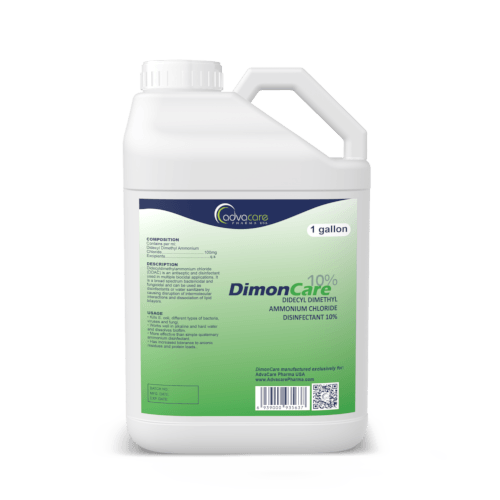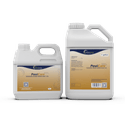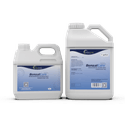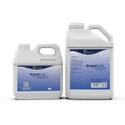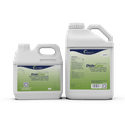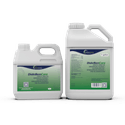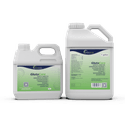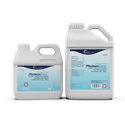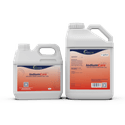- Home›
- Veterinary Pharmaceuticals›
- Veterinary Solutions and Suspensions›
- Veterinary Disinfectants›
- Didecyl Dimethyl Ammonium Chloride (DDAC) Disinfectant
Didecyl Dimethyl Ammonium Chloride (DDAC) Disinfectant
Dosage
Packaging
What is DDAC?
Active Ingredients: Didecyl Dimethyl Ammonium Chloride
Didecyl Dimethyl Ammonium Chloride Disinfectant is used for the general disinfection of surfaces and equipment. It can be used to sanitize farm and vet equipment, such as water circuits, kennels, drinking/feeding troughs, transport vehicles, warehouses, slaughterhouses, and food processing facilities.
Didecyl Dimethyl Ammonium Chloride Disinfectant is typically considered less toxic than other types of chemicals. It also maintains its efficacy in hard water, making it a reliable option for many farms. DDAC belongs to the fourth generation of quats. This group of disinfectants contains 5 similar chemicals. This cationic detergent shows great activity in alkaline pH. It can destroy the cell wall of pathogens, especially against antimicrobial-resistant bacteria. This includes E.coli and Salmonella spp.
This product belongs to the fourth generation and demonstrates a good biocidal activity. It is effective in high soil load, barns, and foot baths. It is effective against protozoan parasites, including Giardia cysts and enveloped viruses. It is also useful in treating fungi (yeasts), mycobacteria, and spores. In veterinary medicine, it can be used for cleaning instruments and hard surfaces.
All quats have a major site of action on cell membranes. Then, they are adsorbed and lead to permeability changes. Hard water and porous and fibrous materials can decrease the activity of this disinfectant. Anionic substances like soaps, fatty acids, proteins, and phosphates can inactivate the quats.
QACs have a limited function as antiseptics. It is because quats can form a film on the skin, and the microorganisms can survive.
This product works by interfering with the cell walls of many types of microorganisms, including bacteria, viruses, and fungi.
This disinfectant should be used in proper concentrations and dosages because concentrations greater than 1% can destroy the mucous membranes of animals.
This quat is also available in 3 combinations, including:
- concentrated solution (Didecyl Dimethyl Ammonium Chloride + Glutaraldehyde Disinfectant)
- concentrated biocide (Didecyl Dimethyl Ammonium Chloride + Glutaraldehyde + Benzalkonium Chloride + Pine Oil Disinfectant)
- broad-spectrum biocide (Didecyl Dimethyl Ammonium Chloride + Glutaraldehyde + Formaldehyde + Glyoxal + Isopropanol 99% Disinfectant)
Didecyl Dimethyl Ammonium Chloride (DDAC) is manufactured and produced by AdvaCare Pharma, a pharmaceutical company specializing in global distribution. Our focus on quality has made AdvaCare a market leader in many countries.
Why are we a leading DDAC manufacturer?
AdvaCare Pharma, an American pharmaceutical company, is the manufacturer of Didecyl Dimethyl Ammonium Chloride (DDAC) Disinfectant. With a wide range of over 250 veterinary medicines, we are a Didecyl Dimethyl Ammonium Chloride (DDAC) manufacturer that focuses on meeting the needs of veterinary distributors worldwide. By emphasizing high-quality, cost-effective veterinary disinfectants and customized market-specific solutions, we deliver the best value for veterinary distributors, vet clinics, veterinarians and farmers.
Uses
What is DDAC used for?
It's used to disinfect surfaces and equipment in environments such as veterinary centers and breeding farms.
How is DDAC Disinfectant used?
This chemical has been manufactured as a solution, which has been intended to be administered to surfaces only. Do not mix this product with other chemicals.
Why are disinfectants used in veterinary medicine?
Disinfectants are used to sanitize farm and vet equipment, such as water circuits, kennels, drinking/feeding troughs, transport vehicles, warehouses, slaughterhouses, and food processing facilities. The activity of disinfectants is nonselective. It ranges from sanitization to sterilization. It can reduce the number of microorganisms, or it can destroy all microorganisms on surfaces. Disinfectants are germicidal compounds added to the facility surface.
This disinfectant has a broad spectrum and potent germicidal activity with long-lasting effects. The effect also depends on the further maintenance of the housing. It depends on the pH, temperature, humidity, and ventilation.
How can DDAC Disinfectant help?
Didecyl Dimethyl Ammonium Chloride (DDAC) is a versatile and effective disinfectant that leads to surface sanitation and microbial sterilization. It is a cationic surfactant with a positive charge on the nitrogen atom that reduces the negative side effects. It has broad-spectrum properties and can ensure hygiene in animal housing.
What microorganisms is DDAC effective against?
Didecyl Dimethyl Ammonium Chloride (DDAC) is effective against many gram-negative and gram-positive bacteria. It disrupts the bacterial cell membrane and leads to cell death. It also has antiviral properties, and it is effective against enveloped viruses. This disinfectant disrupts the virus membrane and prevents infections. It is also effective against fungi, mold, and yeast in the animal’s environment.
Didecyldimethylammonium chloride (DDAC) is a Quaternary Ammonium Compound (QAC) disinfectant often used in the poultry industry to disinfect hard surfaces. DDAC is a membrane-active agent and causes the leakage of important intracellular material. Disinfectants are important for the post-antibiotic era, which is currently present due to the antibiotic resistance that has developed throughout the years. The usage of disinfectants is a good shift from antibiotic usage, especially in poultry production.
Is DDAC Disinfectant safe for use around animals?
DDAC is safe for usage in animal environments, surfaces, and equipment. It can be used to sanitize farm and vet equipment, such as water circuits, kennels, drinking/feeding troughs, transport vehicles, warehouses, slaughterhouses, and food processing facilities. Direct usage around animals should be avoided. The ventilation in the housings at the moment of usage should be proper in order to avoid side effects.
Can DDAC Disinfectant be used on all surfaces?
Hard water and porous and fibrous materials can decrease the efficiency of this product. Some types of fabric can also decrease its activity. It can be used on different surfaces, but the effect will not be the same. It depends on the disinfectant concentration.
It can be used to disinfect medical and laboratory equipment like stainless steel, glass, or plastics.
What is the contact time required for a DDAC Disinfectant to be effective?
Quats are usually effective within a contact time of just 5 minutes. Its effectiveness depends on the product concentration and way of use.
Does DDAC Disinfectant have any residual activity?
This disinfectant shows ongoing antimicrobial activity and can prevent the growth and recontamination of surfaces. The residual activity depends on the surface type. It also depends on the hygiene before sanitization. Debris and insects from the environment should be mechanically cleaned.
How should DDAC be stored?
This bottle should be stored in a dark, dry location between 15-30°C. Keep the bottle sealed tightly when not in use.
Dosage
How much DDAC should be used?
Before sanitization, clean and clear any debris or insects from the area. Dilute the solution to 0.25%-0.80%, depending on the level of disinfection required.
The area can be treated by spraying, soaking, brushing, or fogging.
Refer to a veterinary doctor or pharmacist for guidelines on dosage.
Side Effects
As with all pharmaceuticals, some unwanted effects can occur from the use of Didecyl Dimethyl Ammonium Chloride Disinfectant.
Some side effects may include rash, burning sensation, numbness, and itching. Some instances of dermatitis have been reported. Contact a veterinarian if you notice any of these symptoms in animals after disinfection of their environment.
Some animals may develop difficulty breathing due to the usage of Didecyl Dimethyl Ammonium Chloride Disinfectant. The symptoms of difficulty breathing can become life-threatening, and these symptoms should be managed as soon as possible.
Unventilated environments can increase the chances of skin and eye irritation in animals. If possible, take the animals out of the housing to prevent side effects. After the environment seems clear and dry, take the animals back into the housing.
Mixing 2 different disinfectants can lead to serious chemical reactions and result in side effects in both animals and humans.
Farmers, humans, or owners who perform the disinfection process can face serious side effects if they do not handle the product properly. It can lead to skin rashes, numbness, itching, difficulty breathing, and red eyes. Proper equipment must be worn in order to avoid these side effects.
Follow the recommended dilution ratios in order to avoid side effects.
Precautions
Do NOT use Didecyl Dimethyl Ammonium Chloride Disinfectant in poorly ventilated environments or if the animals in the area have a known allergy or hypersensitivity to any of the ingredients.
Always read and follow the directions on the label to help reduce the risk of exposure to chemical fumes.
Wear protective gloves and eyewear when using this product. Always wash your hands thoroughly after use.
Hard water and porous and fibrous materials can decrease the activity of this disinfectant.
Anionic substances like soaps, fatty acids, proteins, and phosphates can inactivate the quats.
If possible, take the animals out of the housing, and when the environment is clean and dry, take them in again. This will prevent side effects due to the strong chemical compounds.
Use caution when administering to metal or some types of fabric.
Why is DDAC used in veterinary medicine?
This disinfectant is used for sanitation and disinfection of the animal’s housings. It can help in maintaining hygiene and prevent potential pathogens in farms and living environments of animals.
It is useful against bacteria, viruses, and fungi. It is effective against a wide range of microorganisms. It is a good product to avoid excessive antibiotic usage in animals. If the animal’s environments are clean, the chances for infections are reduced. This will prevent antibiotic usage and the occurrence of bacteria resistance in animals.
You might be interested in...
Why AdvaCare Pharma?
As an industry leader, we are aware of our responsibility to provide affordable and sustainable solutions to improve healthcare worldwide.
